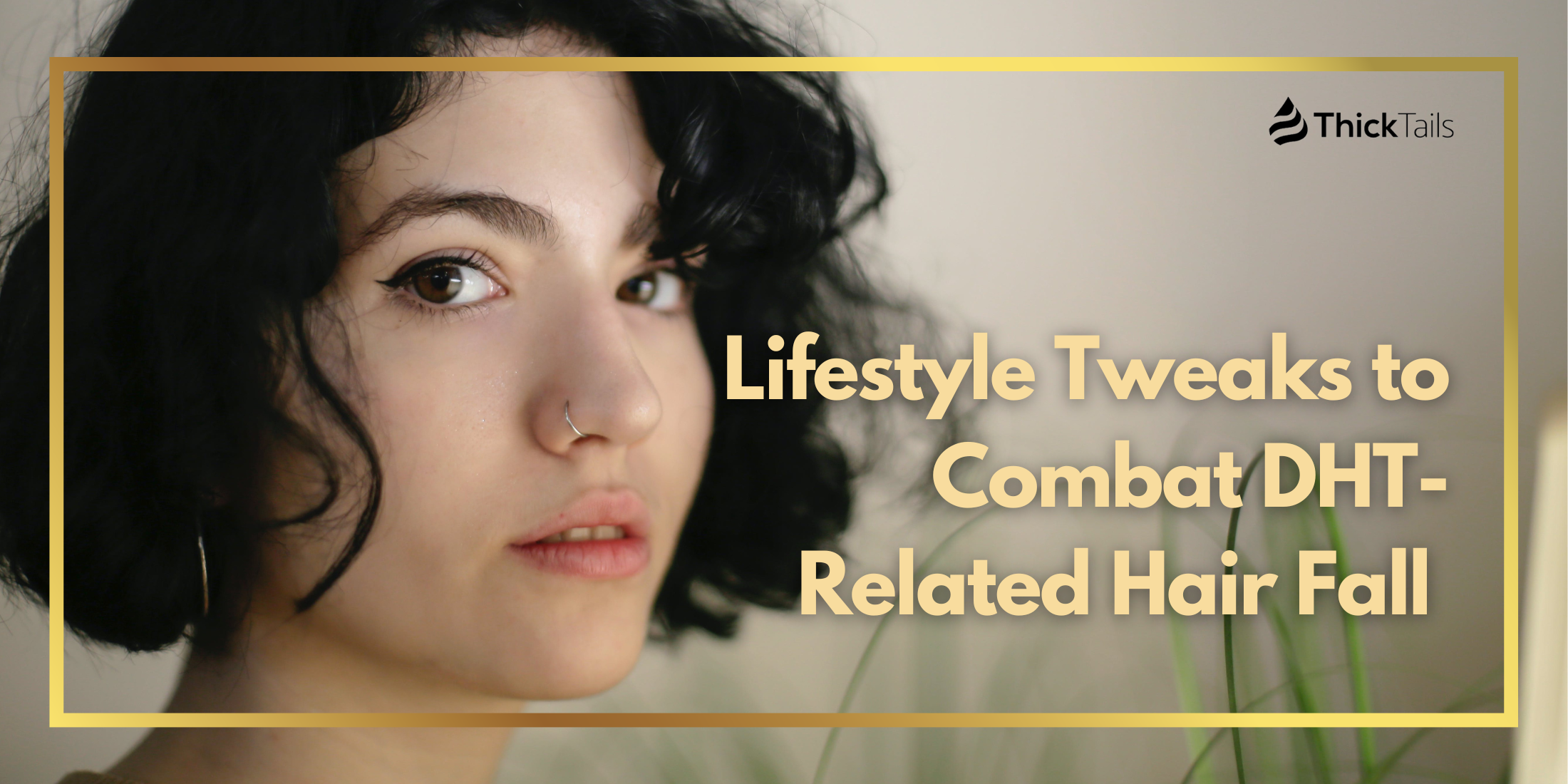Are you struggling with hair fall as a result of DHT (dihydrotestosterone) levels? Many women may experience an increase in DHT-related hair loss during menopause, postpartum recovery or when stressed. It can be frustrating to have your beautiful locks start thinning and falling out, and it's natural for you to want to take action now! Luckily, there are some lifestyle tweaks that you can make which can help reduce the amount of hair fall you're experiencing. In this blog post we'll discuss the effects of elevated DHT on hairs growth cycle and how by making small changes in our daily lives we can combat shedding caused by imbalanced hormones. Keep reading to learn more!
I. Decoding DHT and its Hair Impact

DHT, or dihydrotestosterone, is a hormone that plays a major role in male pattern baldness. It is produced from testosterone by the 5-alpha-reductase enzyme, primarily in the hair follicles and prostate gland. Although DHT is important for sexual development and maintenance of physical characteristics such as muscle mass and bone density, its overproduction can lead to hair loss in both men and women. By blocking the production of DHT, individuals can potentially prevent or slow down the rate of hair loss. Understanding the role of DHT in hair loss is essential for anyone looking to maintain healthy hair and prevent premature baldness.
a. Unveiling DHT's Intricate Role in Hair Loss
Hair loss affects both men and women, and there are numerous factors that contribute to this condition. One of the culprits behind hair loss is DHT, an androgen hormone that is closely linked to male pattern baldness. When DHT levels are too high, it binds to hair follicles and causes them to shrink, leading to shorter, thinner hair strands. This can eventually progress to complete hair loss in the affected areas. While DHT is essential for the development of male characteristics like deep voices and facial hair, it can wreak havoc on the scalp. Understanding the intricate role that DHT plays in hair loss is crucial in developing effective treatments and preventative measures.
b. Surprising Insights into DHT Dynamics
Did you know that there are surprising new insights into the dynamics of DHT and how it impacts hair growth and hair loss? Researchers have discovered a complex relationship between DHT and hair follicles, shedding light on why some people experience hair thinning or baldness. While it used to be thought that DHT directly caused hair loss, new findings have revealed that it actually plays a more nuanced role in regulating the hair growth cycle. By understanding these intricacies of DHT dynamics, scientists are working towards developing better treatments for hair loss and promoting healthy hair growth.
c. Lifestyle's Silent Influence on DHT Levels
Ah, hair loss. It's one of those topics that many of us try to avoid discussing. But here's the thing - did you know that your lifestyle could be silently influencing your DHT levels? And when your DHT levels are out of whack, well, that's when things start to go south with your hair. Of course, there are supplements you can take to help combat hair loss. But if you're not addressing the root causes of your hair loss (pun intended), then those supplements might not be as effective as you hope. So take a closer look at your lifestyle and habits, and see if there are any changes you can make to help keep your hair strong, healthy, and on your head where it belongs.
II. Tailoring Lifestyle for Natural Hair Fortification
Maintaining healthy and strong natural hair can be a challenging task, but tailoring your lifestyle to address the root cause can make all the difference. Hormones play a vital role in hair growth, especially the production of dihydrotestosterone (DHT). High levels of DHT can damage hair follicles, leading to hair loss and thinning. Therefore, it's essential to adopt a lifestyle that promotes hormonal balance. This includes regular exercise, a healthy diet, and stress reduction techniques such as meditation or yoga. Additionally, incorporating hair fortifying products that target DHT, such as natural oils and all-natural shampoos, can aid in maintaining healthy hair. By taking a holistic approach, you can tailor your lifestyle for natural hair fortification and achieve your desired hair goals.
a. Nutritional Strategies to Counteract DHT
Hair loss can be a frustrating issue to deal with. While genetics and hormones play a big role in the development of male pattern baldness, poor nutrition can exacerbate the problem. Luckily, there are a few nutritional strategies you can implement to counteract the effects of dihydrotestosterone (DHT), the hormone responsible for hair loss. Including hair supplements in your diet can be a good place to start. Supplements like biotin and saw palmetto have been shown to help improve hair growth and thickness. Additionally, maintaining a balanced diet rich in protein, antioxidants, and healthy fats can also support hair health. By implementing these strategies, you may be able to slow down or even reverse the effects of hair loss caused by DHT.
b. Unearthing DHT-Blocking Supplements Beyond the Basics
Hair supplements have been around for quite some time, promising to nourish hair and reduce hair loss. However, one particular ingredient that has gained recent attention is DHT-blocking supplements. DHT, or dihydrotestosterone, is a hormone that can cause hair loss when produced excessively. While there are already widely-known supplements that inhibit DHT production, a growing number of alternative and lesser-known options are now emerging in the market. These new supplements go beyond the basics and offer unique blends of plant extracts, vitamins, and minerals that specifically target DHT levels. With more research and testing being done on these supplements, it's exciting to see what new discoveries we'll uncover in the realm of hair health.
c. Stress Alleviation: A Powerful Tool Against DHT-Linked Hair Fall
Hair fall can be a frustrating and often embarrassing experience for many individuals. The common culprit behind hair fall is DHT, which is a hormone linked to male pattern baldness. Fortunately, stress alleviation techniques have been found to be a powerful tool against DHT-related hair fall. By reducing stress levels, individuals can reduce the production of DHT and its effects on hair follicles. Techniques such as deep breathing, meditation, and yoga have been proven effective in reducing stress levels and ultimately improving the health of hair. So, take a deep breath and prioritize self-care to combat hair fall caused by DHT.
III. Revolutionizing Your Hair Care Ritual

Your hair care routine could be revolutionized by paying attention to your hormonal fluctuations. Did you know that hormones play a significant role in hair health and growth? When your hormone levels fluctuate, it can lead to issues like hair loss or breakage. By understanding this, you can adjust your hair care regimen accordingly. For example, during certain times of the month, you may need to use a more nourishing or hydrating hair mask to combat dryness. Overall, taking the time to tune in to your body's hormonal changes can make a big impact on the health and appearance of your hair.
a. Deciphering DHT-Blocking Shampoos: What to Look For
If you're experiencing hair loss, you're likely on the hunt for a shampoo that can reverse the effects of DHT. But with so many products on the market, it can be overwhelming to decipher which ones actually work. One key ingredient to look out for is saw palmetto. This natural extract has been shown to block DHT production, leading to thicker, fuller hair. While there are no guarantees when it comes to hair growth, incorporating a saw palmetto-based shampoo into your routine could be a step in the right direction.
b. Condition Your Way to DHT Defense
Maintaining a healthy head of hair can feel like a never-ending battle, especially as we age. Fortunately, protecting against hair loss and thinning may be as simple as adding a quality conditioner to our hair care routine. Using a hair conditioner not only softens and hydrates our locks, but it can also help defend against the damaging hormonal byproduct known as DHT. Experts suggest looking for conditioners that contain ingredients like biotin, vitamin E, and keratin to promote hair growth and strengthen strands. So, next time you're in the hair care aisle, don't forget to pick up a bottle of conditioner and start conditioning your way to DHT defense.
c. Serum Power: Targeted Solutions for DHT-Related Hair Woes
If you're struggling with DHT-related hair issues, a hair serum may be just the solution you need. Many people experience hair loss and thinning due to excessive levels of DHT in their scalp. But with the right targeted serum, you can combat these issues and rejuvenate your mane. Hair serums that target DHT-related hair woes work by inhibiting the production of this hormone, which can cause hair to fall out or stop growing altogether. Additionally, these serums often include vital nutrients and vitamins to support hair health and encourage growth. So if you're looking for an effective and targeted solution to your DHT-related hair problems, a serum may be the answer you've been searching for.
By approaching hair loss through the lens of DHT, it's possible to uncover new and potentially effective strategies you can use to solve even your most difficult cases of hair thinning. To make this a reality, we must learn how lifestyle choices impact DHT levels, explore core nutritional interventions to augment our defenses against DHT-induced hair fall, and revolutionize our beauty routines with the right shampoos, conditioners, and serums tailored to our individual needs. With these tips and pieces of advice in mind, you'll be able to boost your chances at beating the stigma of baldness as well give your hair the fortification it deserves! Change starts here: What lifestyle modifications will you commit to on your journey toward healthier hair?







